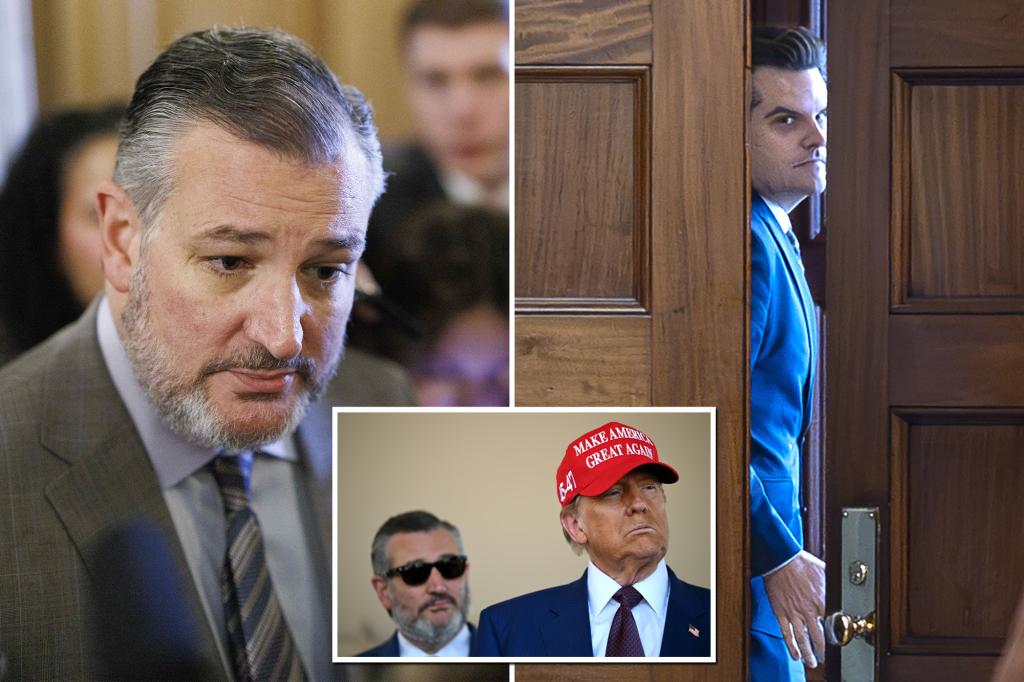The behind-the-scenes maneuvering surrounding Donald Trump’s cabinet selections for his potential second term as president reveals a complex interplay of political calculation, personal relationships, and potential scandal. The aborted nomination of Matt Gaetz for Attorney General serves as a prime example of this intricate dance, highlighting the influence of Senator Ted Cruz and the strategic adjustments made by the Trump transition team. Gaetz, facing a resurgence of serious allegations, including a buried House Ethics Committee report regarding sexual misconduct with a minor, found his path to confirmation blocked by a lack of Senate support. This lack of support was communicated to Trump through Senator Cruz, who reportedly played a crucial, albeit clandestine, role in convincing Trump that Gaetz’s nomination was untenable.
Cruz, a seasoned politician and former Texas solicitor general, reportedly harbored reservations about Gaetz’s suitability for the position of Attorney General. These reservations, combined with the swirling controversy surrounding Gaetz’s past, contributed to Cruz’s assessment that the former Florida congressman lacked the necessary votes for confirmation. This assessment, relayed to Trump following a private meeting, proved decisive in the eventual withdrawal of Gaetz’s nomination. The timing of Cruz’s communication with Trump coincides with their joint attendance at Elon Musk’s SpaceX rocket launch in Texas, suggesting a possible opportunity for a discreet conversation on the matter. While both Cruz and the Trump transition team remained tight-lipped about the specifics of their interactions, the sequence of events strongly suggests Cruz’s influence in shaping Trump’s decision.
Gaetz’s withdrawal from consideration followed a meeting with Republican senators on Capitol Hill, further reinforcing the notion that his path to confirmation was obstructed. Publicly, Gaetz attributed his decision to the distracting nature of the allegations against him, claiming a desire to avoid a protracted political battle that could hinder the swift establishment of Trump’s Justice Department. However, the private whip count and Cruz’s reported intervention paint a more nuanced picture, revealing the strategic calculations behind Gaetz’s seemingly altruistic withdrawal. The decision, while presented as a personal choice to prioritize the transition process, appears to have been heavily influenced by the realization that his nomination was doomed to fail.
The Trump transition team’s subsequent handling of nominations, particularly that of Pete Hegseth for Secretary of Defense, demonstrates a shift in strategy following the Gaetz episode. Learning from the Gaetz situation, the team adopted a more proactive and public approach to managing potential opposition to their nominees. Trump’s vocal and unwavering support for Hegseth, despite the latter’s lack of traditional qualifications for the position, illustrates this change in tactics. The transition team’s public pronouncements of Hegseth’s qualifications and strong support within the party appear to be a preemptive measure aimed at solidifying his nomination and discouraging dissent.
The contrasting approaches to the Gaetz and Hegseth nominations highlight the Trump transition team’s evolving strategy. The quiet maneuvering and behind-the-scenes lobbying in the Gaetz case, culminating in a discreet intervention by Senator Cruz, gave way to a more public and assertive campaign in support of Hegseth. This shift suggests a learned response to the challenges encountered in the Gaetz nomination, demonstrating an adaptability and willingness to adjust tactics based on previous experiences. The transition team’s proactive defense of Hegseth contrasts sharply with the more reactive approach taken during the Gaetz debacle, indicating a conscious effort to control the narrative and preempt potential opposition.
The episode involving Matt Gaetz’s failed nomination for Attorney General provides a glimpse into the intricate workings of presidential transitions, where political maneuvering, personal relationships, and the specter of scandal can significantly impact personnel decisions. Senator Ted Cruz’s reported role as a confidential advisor to Trump underscores the importance of back-channel communications and the influence of trusted confidantes. The Trump transition team’s subsequent shift in strategy, moving from a more discreet approach to a more public and assertive one, demonstrates a capacity for adaptation and a willingness to learn from past experiences. The contrasting fates of Gaetz and Hegseth highlight the dynamic and often unpredictable nature of the political landscape, where even the most carefully laid plans can be derailed by unforeseen circumstances and strategic adjustments become essential for navigating the complex path to power.










